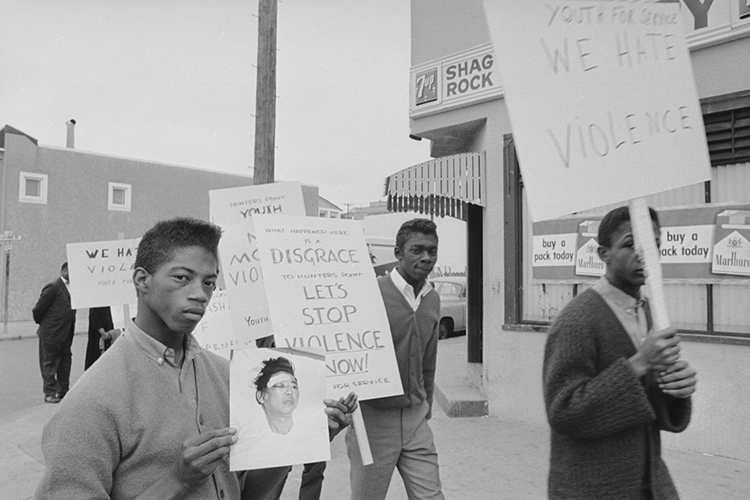Racial Justice in America: A deeper look
Berkeley News series examines the roots and impact of systemic racism in American society
September 22, 2020

Racial justice protests in America have existed for centuries, yet the nation has not fully reconciled with a violent and racist history that continues to impact communities of color to this day. Berkeley News will take a deeper look through a “Racial Justice in America” series. (Photo courtesy of UC Berkeley Bancroft Library)
You see it on your social media feed: Videos of police called to investigate a Black person for doing something as simple as swimming in a pool, sitting at a café, sleeping in their car or going for a morning jog.
You see it in the racial makeup of your typical American prison and in the homogenous white population of a suburban Bay Area neighborhood. You see it in the lack of polling stations in communities of color and in the typical skin color of the political candidates on their ballots.
And, you see it in the monuments that represent Confederate leaders and slave owners throughout the country, and in the very halls and buildings at UC Berkeley named after white men who advocated and defended anti-Blackness.
Systemic racism is part of the very foundation of America, from the violent colonial conquests of indigenous lands to state-sponsored slavery that fueled the country’s burgeoning economy.
America, though, has yet to fully reconcile with its racist past, despite generations of social movements rallying against the nation’s violent foundations. Earlier this year, the death of George Floyd has once again sparked public outrage toward systemic racism and provided proof for those who didn’t know the deadly price of institutions built from white supremacy.
But today, we see a growing movement of people joining racial justice protests around the country. Protests that represent an angst and cynicism toward a system that many feel has oppressed people of color and their communities for far too long.
UC Berkeley’s Office of Communications and Public Affairs will seek to make sense of American racism through a new “Racial Justice in America” series. The Berkeley News editorial team will probe some of the world’s best minds in fields of study including social welfare, public health, education, history and law.
The series will aggressively explore the history of white supremacy and racism that is being manifested in every facet of American society.
“We find ourselves in a moment that demands deep introspection, a profound soul-searching that transcends the horrific slayings of Breonna Taylor, George Floyd and Ahmaud Arbery,” said Roqua Montez, Berkeley’s executive director of communications and media relations. “Ultimately, it’s about rectifying the very real, very pervasive and very perverse conditions that led to these killings and the violent deaths of so, so many more before them.
“To move forward, we as Americans have to dismantle these violent systems — systems that enforce inequality with a brutal efficiency — and build more just, equitable systems.”
How America and its institutions were created matters.
This is our history. It’s not anti-American to teach it. It’s incredibly American.”
– Professor Denise Herd
“This is our history,” said Denise Herd, a Berkeley professor of public health who is also associate director of the campus’s Othering and Belonging Institute. “It’s not anti-American to teach it. It’s incredibly American. I think there are a lot of people who are interested in working on racial justice issues right now, so there’s an urgency to talk about this and to write about it, and there should be, because everybody needs to really understand this history in order to tackle its contemporary effects.”
The series will also illuminate research by Berkeley scholars, including studies examining why older, unarmed Black men who suffer from mental illness are particularly vulnerable to violence during police encounters, or the psychological dynamics of racism.
While tackling anti-Blackness will be a priority for the new series, the impact of racism on all people of color will be presented, including the stories of indigenous women and girls who have gone missing near oil pipeline camps and studies about the disproportionate impact of COVID-19 on Native populations.
Berkeley students, faculty and staff activism will also be covered, including a profile on performance studies professor Angela Marino, who runs a theatre on campus to build community among people of color.
New courses that examine the role of race in our democratic systems will be analyzed, such as an African American studies and public policy class focused on the racial inequalities that exist in the U.S. Constitution and how they continue to impact American elections.
Berkeley historians will help us to recognize America’s checkered past, including through a feature story on a new documentary about the 1921 Tulsa Race Massacre being worked on by a Berkeley faculty member.
“If we are at all serious about ending racism, we must have a precise and clear-eyed comprehension of what it is we are ending,” said Berkeley history professor Waldo Martin, who also teaches courses in African American studies. “In turn, our multi-leveled and multi-pronged efforts to achieve the destruction of racism must be guided by that comprehension.”
The Berkeley News series follows campuswide initiatives that encourage increased campus programs to explore social justice and racism. Additional Berkeley efforts include reforms to the campus police department; an examination of proposals to unname particular campus buildings, on the heels of denaming the Berkeley Law building; and new scholarships for students of color that help to increase diversity on campus.
Chancellor Carol Christ said that members of the Berkeley community have a responsibility to do what they can to confront and vanquish racism and racial injustice.
“While American democracy was founded on the principles of equal rights, justice and opportunity, those ideals have not been realized for all. We have failed to destroy the plagues of racism and anti-Blackness in the present day,” Christ said. “The combination of Berkeley’s excellent academic resources and our community’s long-standing dedication to making the world a better place means we are uniquely positioned — and motivated — to propel societal change. We have an opportunity, an opportunity that must not be squandered.”
